Unit 1 Where did you go on vacation? Section A Grammar Focus-3c课件33张
文档属性
| 名称 | Unit 1 Where did you go on vacation? Section A Grammar Focus-3c课件33张 | 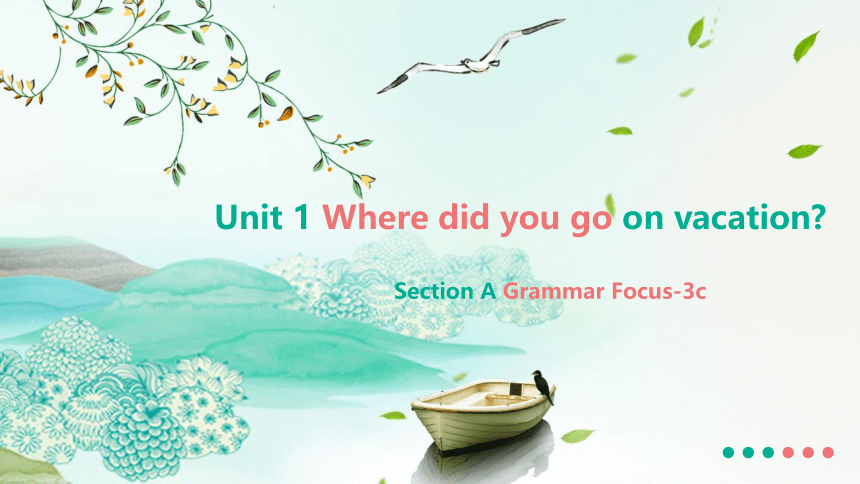 | |
| 格式 | pptx | ||
| 文件大小 | 7.8MB | ||
| 资源类型 | 教案 | ||
| 版本资源 | 人教新目标(Go for it)版 | ||
| 科目 | 英语 | ||
| 更新时间 | 2021-08-28 07:29:30 | ||
图片预览

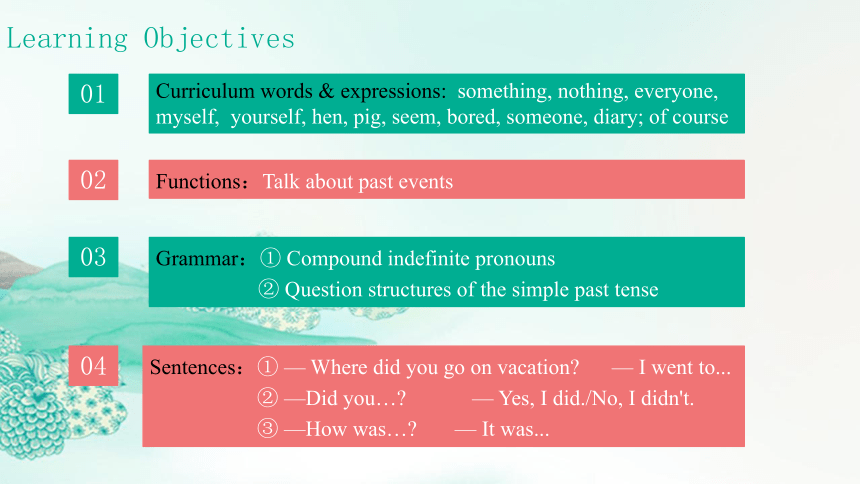
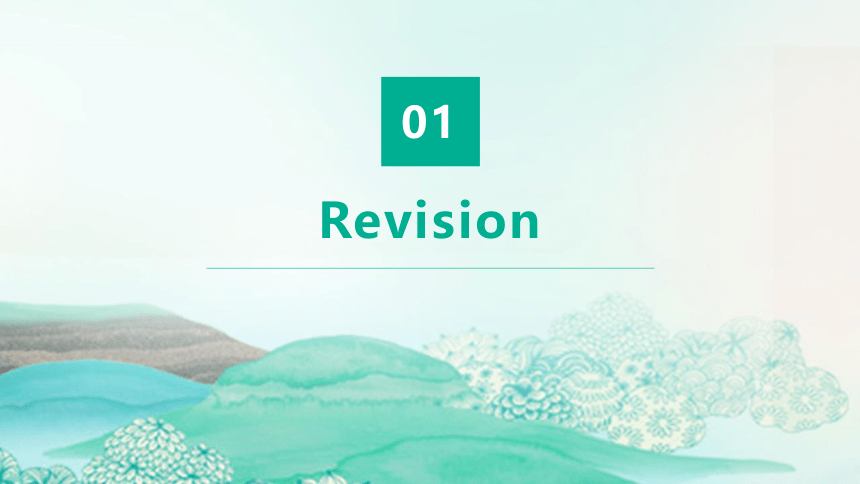
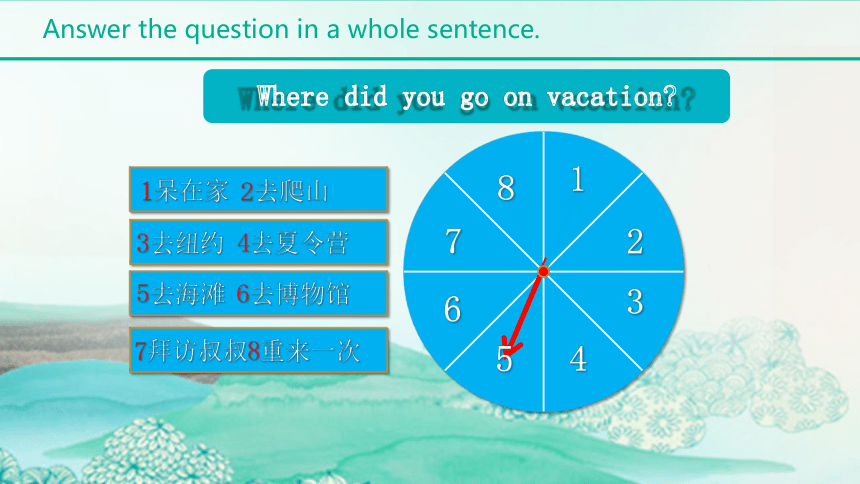
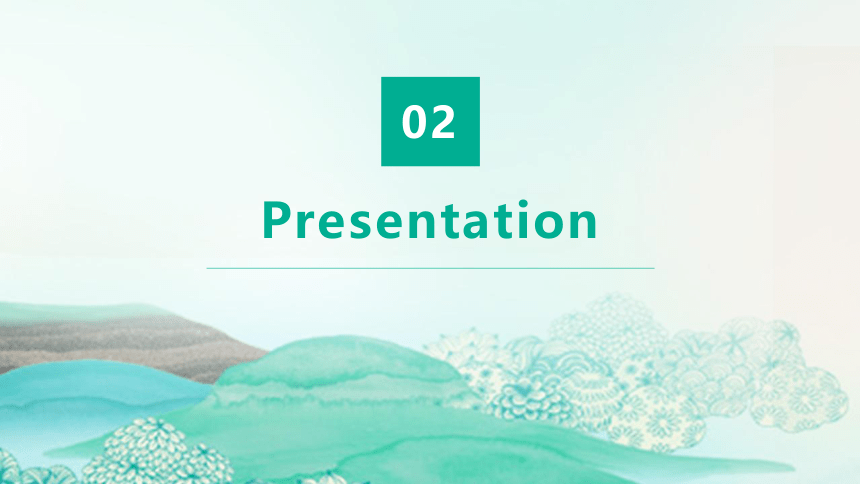
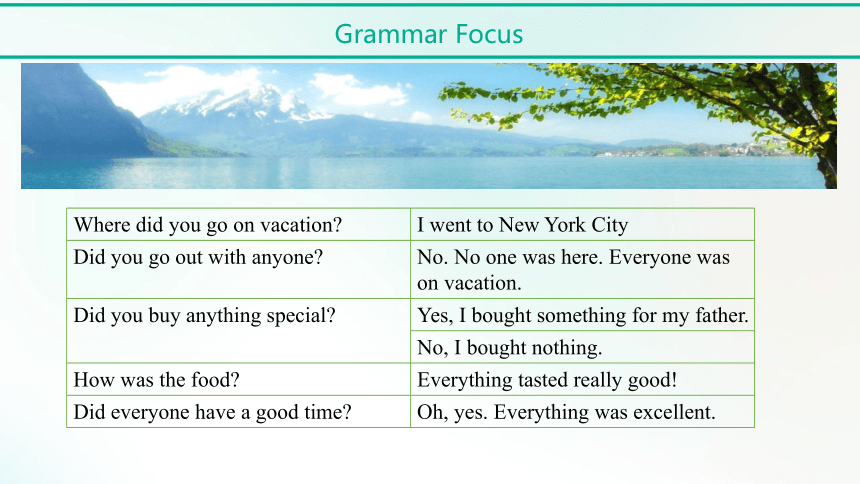
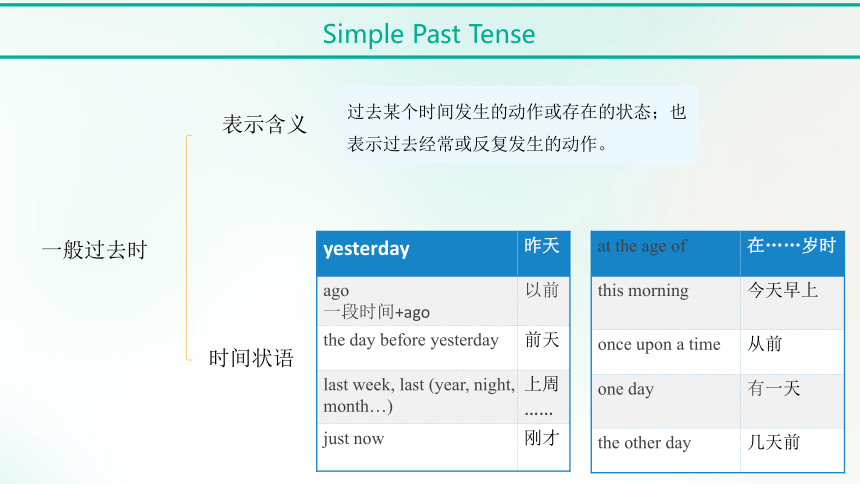
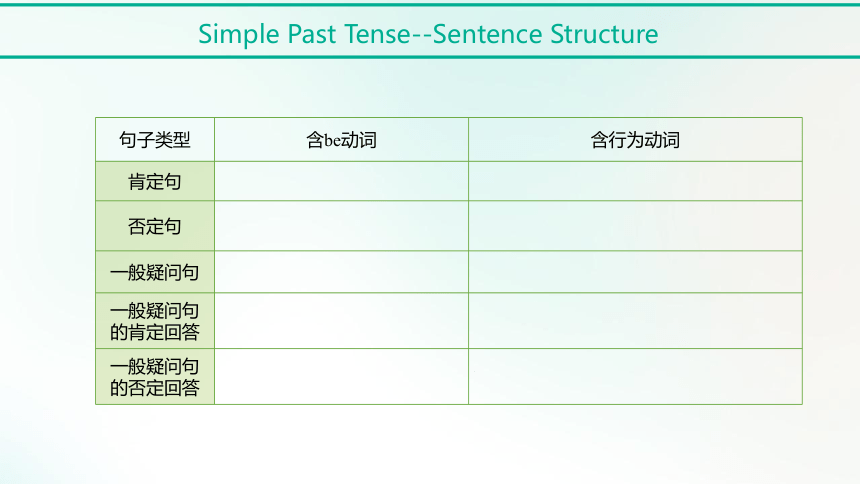
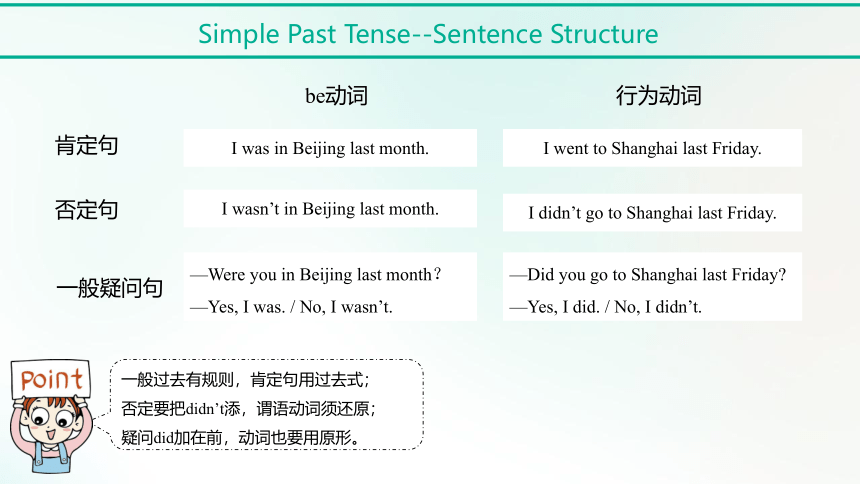
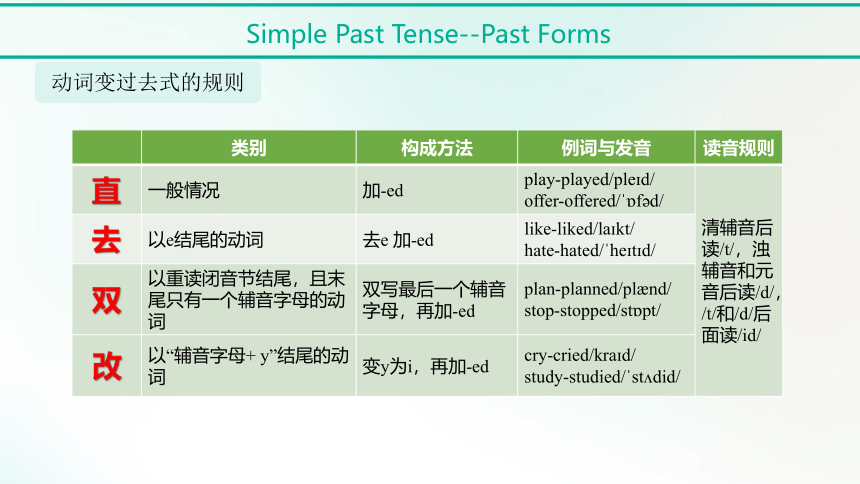
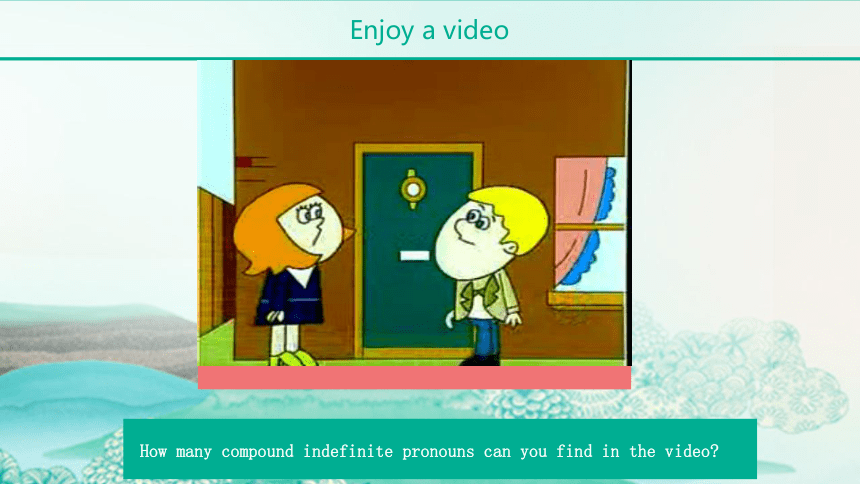
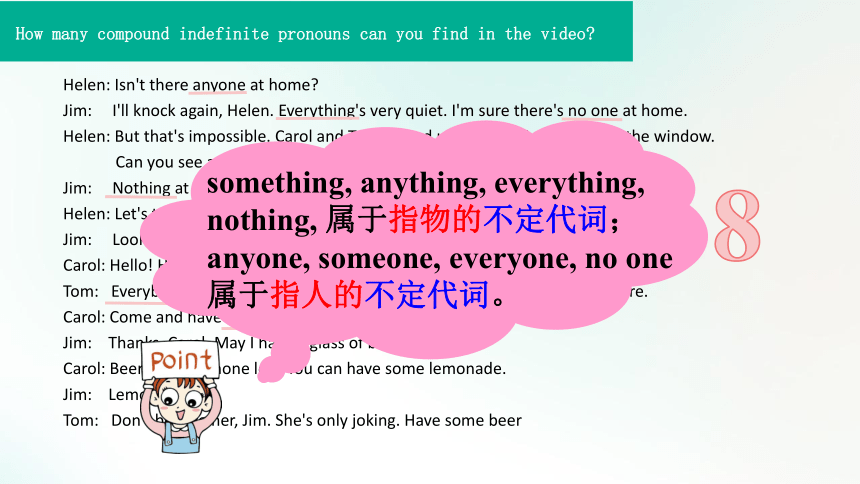
文档简介
(共33张PPT)
Section
A
Grammar
Focus-3c
Unit
1
Where
did
you
go
on
vacation?
Functions:Talk
about
past
events
Grammar:①
Compound
indefinite
pronouns
②
Question
structures
of
the
simple
past
tense
Sentences:①
—
Where
did
you
go
on
vacation?
—
I
went
to...
②
—Did
you…?
—
Yes,
I
did./No,
I
didn't.
③
—How
was…?
—
It
was...
Learning
Objectives
Curriculum
words
&
expressions:
something,
nothing,
everyone,
myself,
yourself,
hen,
pig,
seem,
bored,
someone,
diary;
of
course
02
03
04
01
01
Revision
Where
did
you
go
on
vacation?
1
2
3
4
5
6
7
8
1呆在家
2去爬山
3去纽约
4去夏令营
5去海滩
6去博物馆
7拜访叔叔8重来一次
Answer
the
question
in
a
whole
sentence.
02
Presentation
Where
did
you
go
on
vacation?
I
went
to
New
York
City
Did
you
go
out
with
anyone?
No.
No
one
was
here.
Everyone
was
on
vacation.
Did
you
buy
anything
special?
Yes,
I
bought
something
for
my
father.
No,
I
bought
nothing.
How
was
the
food?
Everything
tasted
really
good!
Did
everyone
have
a
good
time?
Oh,
yes.
Everything
was
excellent.
Grammar
Focus
表示含义
时间状语
过去某个时间发生的动作或存在的状态;也表示过去经常或反复发生的动作。
一般过去时
Simple
Past
Tense
yesterday
昨天
ago
一段时间+ago
以前
the
day
before
yesterday
前天
last
week,
last
(year,
night,
month…)
上周
……
just
now
刚才
at
the
age
of
在……岁时
this
morning
今天早上
once
upon
a
time
从前
one
day
有一天
the
other
day
几天前
句子类型
含be动词
含行为动词
肯定句
主语
+
was/were
+
其他.
主语
+
动词过去式
+
其他.
否定句
主语
+
was/were
+
not
+
其他.
主语
+
didn’t
+
动词原形
+
其他.
一般疑问句
Was/Were
+
主语+其他?
Did
+
主语
+
动词原形
+
其他?
一般疑问句的肯定回答
Yes,
主语
+
was/were.
Yes,
主语
+
did.
一般疑问句的否定回答
No,
主语
+
wasn’t/weren’t.
No,
主语
+
didn’t.
Simple
Past
Tense--Sentence
Structure
I
was
in
Beijing
last
month.
I
went
to
Shanghai
last
Friday.
I
wasn’t
in
Beijing
last
month.
I
didn’t
go
to
Shanghai
last
Friday.
—Were
you
in
Beijing
last
month?
—Yes,
I
was.
/
No,
I
wasn’t.
—Did
you
go
to
Shanghai
last
Friday?
—Yes,
I
did.
/
No,
I
didn’t.
肯定句
否定句
一般疑问句
be动词
行为动词
一般过去有规则,肯定句用过去式;
否定要把didn’t添,谓语动词须还原;
疑问did加在前,动词也要用原形。
Simple
Past
Tense--Sentence
Structure
Simple
Past
Tense--Past
Forms
类别
构成方法
例词与发音
读音规则
直
一般情况
加-ed
play-played/ple?d/
offer-offered/??f?d/
清辅音后读/t/,浊辅音和元音后读/d/,/t/和/d/后面读/id/
去
以e结尾的动词
去e
加-ed
like-liked/la?kt/
hate-hated/?he?t?d/
双
以重读闭音节结尾,且末尾只有一个辅音字母的动词
双写最后一个辅音字母,再加-ed
plan-planned/pl?nd/
stop-stopped/st?pt/
改
以“辅音字母+
y”结尾的动词
变y为i,再加-ed
cry-cried/kra?d/
study-studied/?st?did/
动词变过去式的规则
Enjoy
a
video
How
many
compound
indefinite
pronouns
can
you
find
in
the
video?
Helen:
Isn't
there
anyone
at
home?
Jim:
I'll
knock
again,
Helen.
Everything's
very
quiet.
I'm
sure
there's
no
one
at
home.
Helen:
But
that's
impossible.
Carol
and
Tom
invited
us
to
lunch.
Look
through
the
window.
Can
you
see
anything?
Jim:
Nothing
at
all.
Helen:
Let's
try
the
back
door.
Jim:
Look!
Everyone's
in
the
garden.
Carol:
Hello!
Hello!
Hello!
Jim!
Tom:
Everybody
wants
to
have
lunch
in
the
garden.
It's
nice
and
warm
out
here.
Carol:
Come
and
have
something
to
drink.
Jim:
Thanks,
Carol.
May
I
have
a
glass
of
beer
please?
Carol:
Beer?
There's
none
left.
You
can
have
some
lemonade.
Jim:
Lemonade!
Tom:
Don't
believe
her,
Jim.
She's
only
joking.
Have
some
beer
How
many
compound
indefinite
pronouns
can
you
find
in
the
video?
something,
anything,
everything,
nothing,
属于指物的不定代词;
anyone,
someone,
everyone,
no
one
属于指人的不定代词。
8
For
people
everyone
someone
anyone
no
one
any
+one
任何人
every
+
one
每人;人人
no
one
要分开
没有人
some
+
one
某人
For
things
nothing
something
anything
everything
some
+
thing
某事
every
+
thing
每件事,所有事
any
+
thing
任何事物
no
+
thing
没有什么
Compound
Indefinite
Pronouns
复合不定代词是由some,any,
no,every加上-body,
-one,-thing构成的不定代词。功能相当于名词,在句中可作主语、宾语或表语,不能作定语。
some-类
any-类
no-类
every-类
-body
somebody某人;有人
anybody
任何人
nobody
没有人
everybody
每人;人人;
所有人
-one
someone
某人;有人
anyone
任何人
no
one
没有人
everyone
每人;人人;
所有人
-thing
something
某事,某物
anything
任何东西;任何事物
nothing
没有什么
everything
每件事;
所有事物;
一切
前词
后词
Nothing
is
difficult
if
you
put
your
heart
into
it.
I
have
nothing
to
say.
我没什么可说的。
Her
son
is
everything
for
her.
对她来说,儿子就是一切。
作主语
作宾语
作表语
Compound
Indefinite
Pronouns
Things
to
remember
somebody=someone
anybody=anyone
nobody=no
one
not
anybody=nobody
not
anyone=no
one
not
anything=nothing
There
is
not
anybody
in
the
room.
=There
is
nobody
in
the
pound
Indefinite
Pronouns
复合不定代词作主语时,谓语动词要用单数形式。
Nothing
is
difficult
if
you
put
your
heart
into
it.
Nothing
is
impossible.
一切皆有可能。
Compound
Indefinite
Pronouns
复合不定代词被定语(形容词、不定式、else等)修饰时,定语要后置。
复合不定代词
+
形容词
复合不定代词
+
不定式
There
is
something
important
in
today’s
newspaper.
今天报纸上有一些重要的信息。
Do
you
have
anything
to
say?
你有什么要说的吗?
Ask
someone
else
to
help
you.
另请个人来帮帮你吧。
Compound
Indefinite
Pronouns
somebody/
someone/
something一般用于肯定句,以及希望得到肯定回答的一般疑问句。
anybody/
anyone/
anything一般用于否定句、一般疑问句或强调任何之意的肯定句。
复合不定代词
用法
例句
everything
everyone
everybody
用于肯定句、否定句及疑问句中
Everyone
is
here
today.
Money
isn’t
everything.
How
is
everything?
Did
everyone
in
your
class
go
for
a
trip?
03
Practice
Compound
Indefinite
Pronouns
Last
week,
I
went
________
and
I
took
lots
of
photos.
interesting
somewhere
B.
somewhere
interesting
C.
interesting
anywhere
D.
anywhere
interesting
2.
Did
you
go
____?
warm
somewhere
B.
anywhere
warm
C.
warm
anywhere
D.
somewhere
warm
3.
I
can’t
find
my
pen
________.
somewhere
B.
nowhere
C.
anywhere
D.
everywhere
3a
anyone
something
anything
everything
nothing
Linda:
Did
you
do
_________
fun
on
your
vacation,
Alice?
Alice:
Yes,
I
did.
I
went
to
Sanya.
Linda:
How
did
you
like
it?
Alice:
Well,
it
was
my
first
time
there,
so_________
was
really
interesting.
Linda:
Did
you
do
with
________?
Alice:
Yes,
I
did.
I
went
with
my
sister.
Linda:
Did
you
go
shopping?
Alice:
Of
course!
I
bought
__________
for
my
parents,
but
_________
for
myself.
Linda:
Why
didn’t
you
buy
_________
for
yourself
?
Alice:
I
didn’t
really
see__________
I
liked.
anything
everything
anyone
something
nothing
anything
anything
Fill
in
the
blanks
with
the
words
in
the
box
and
practice
the
conversation.
当然;自然。
Of
course
not.
当然不。
反身代词,我自己
反身代词,你自己
teach
oneself自学
I
teach
myself
English.
我自学英语。
learn..by
oneself自学
I
learn
English
by
myself
.
enjoy
oneself玩得高兴
We
enjoyed
ourselves.
我们玩得很开心。
by
oneself独自;独立
I
do
my
homework
by
myself.
我独立完成作业。
help
oneself
to
sth.
自取/自用...;随便吃...
You
can
help
yourself
to
the
milk.
1.How
did
you
like
it?
=What
do
you
think
of
it?
你觉得它怎么样?
单myself
复ourselves
单yourself
复yourselves
单himself/herself/itself
复themselves
3b
anything
everything
nothing
everyone
no
one
anything
everyone/anyone
Everything
nothing
no
one
Fill
in
the
blanks
in
the
email
message
with
the
words
in
the
box.
04
Production
Ask
your
group
questions
about
their
last
vacation.
Then
tell
the
class
your
results
3c
Did
you…
Everyone
Someone(write
the
classmate’s
name)
No
one
eat
anything
at
a
restaurant?
read
anything
interesting?
visit
anyone
in
your
family?
buy
anything?
keep
a
diary?
In
our
group,
everyone
ate
something
at
a
restaurant…
05
Exercises
一
单项选择
1
David
is
a
tennis
player.
He
to
play
tennis
when
he
was
six
years
old.
(北京中考)
begins
B.
will
begin
C.
began
D.
has
begun
2
There
six
countries
in
SCO(上合组织)
at
first,
but
now
the
number
has
increased
to
eight.
(东营中考)
is
B.
are
C.
were
D.
will
be
C
C
3
—Is
there
else
in
the
classroom?
—It’s
empty.
is
listening
to
a
speech
in
the
school
hall.(泰州中考)
anyone;
Anyone
B.
anyone;
Everyone
C.
everyone;
Anyone
D.
everyone;
Everyone
B
4
Please
listen
to
the
teacher
carefully.
She
has
important
to
tell
us.
something
B.
everything
C.
anything
D.
nothing
A
二
改错
1
I
didn’t
see
someone
in
the
theater.
(
)
______________
2
Did
you
find
funny
anything
in
the
book?
(
)
______________
A
B
C
3
There
are
something
wrong
with
my
bike.
(
)
_____________
A
B
C
A
B
C
B
AB
A
anyone
anything
funny
is
三
完成句子
1
今天的报纸上没有什么有趣的东西。
There
is
in
today’s
newspaper.
2
如果你想保持牙齿健康,你最好不要吃任何甜食。
If
you
want
to
keep
your
teeth
healthy,
you'd
better
not
eat
__________
__________
a
lot.
我有一些重要的事情要告诉汤姆。
I
have
to
tell
Tom.
3
something
important
nothing
interesting
anything
sweet
06
Summary
复合不定代词
指人(以-one/-body结尾)
指物(以-thing结尾)
everybody
(每个人)
someone
(某人)
everyone
(每个人)
anyone
(任何人)
everything
(一切事物)
anything
(任何事物)
something
(某事物)
nothing
(没有什么)
somebody
(某人)
anybody
(任何人)
no
one
(没有人)
nobody
(没有人)
复合代词要牢记,修饰成分后边放,
如若它来作主语,谓语单数没商量。
some-代词肯定句,any-代词否、疑忙,
若是希望得肯定,some-代词不相让。
时间状语
动词变化
v.+ed
v.+d
y变i加-ed
双写辅音字母加-ed
规则
变化
不规则变化
is/am-was
are-were
do-did
cut-cut
swim-swam ride-rode
draw-drew bring-brought
build-built
feel-felt
play-played
offer-offered
like-liked
hate-hated
cry-cried
study-studied
plan-planned
stop-stopped
yesterday,
last
month,last
year,
just
now,...ago
基本句式
肯定句
否定句
一般疑问句及回答
主语+was/were+其他.
主语+动词过去式+其他.
主语+was/were+not+其他.
主语+didn‘t+动词原形+其他.
Was/were+主语+其他?
Yes,
主语+was/were.
No,
主语+wasn't/weren't.
Did+主语+动词原形+其他?
Yes,
主语+did.
No,
主语+didin't.
一般过去时
Thank
you
!
Section
A
Grammar
Focus-3c
Unit
1
Where
did
you
go
on
vacation?
Functions:Talk
about
past
events
Grammar:①
Compound
indefinite
pronouns
②
Question
structures
of
the
simple
past
tense
Sentences:①
—
Where
did
you
go
on
vacation?
—
I
went
to...
②
—Did
you…?
—
Yes,
I
did./No,
I
didn't.
③
—How
was…?
—
It
was...
Learning
Objectives
Curriculum
words
&
expressions:
something,
nothing,
everyone,
myself,
yourself,
hen,
pig,
seem,
bored,
someone,
diary;
of
course
02
03
04
01
01
Revision
Where
did
you
go
on
vacation?
1
2
3
4
5
6
7
8
1呆在家
2去爬山
3去纽约
4去夏令营
5去海滩
6去博物馆
7拜访叔叔8重来一次
Answer
the
question
in
a
whole
sentence.
02
Presentation
Where
did
you
go
on
vacation?
I
went
to
New
York
City
Did
you
go
out
with
anyone?
No.
No
one
was
here.
Everyone
was
on
vacation.
Did
you
buy
anything
special?
Yes,
I
bought
something
for
my
father.
No,
I
bought
nothing.
How
was
the
food?
Everything
tasted
really
good!
Did
everyone
have
a
good
time?
Oh,
yes.
Everything
was
excellent.
Grammar
Focus
表示含义
时间状语
过去某个时间发生的动作或存在的状态;也表示过去经常或反复发生的动作。
一般过去时
Simple
Past
Tense
yesterday
昨天
ago
一段时间+ago
以前
the
day
before
yesterday
前天
last
week,
last
(year,
night,
month…)
上周
……
just
now
刚才
at
the
age
of
在……岁时
this
morning
今天早上
once
upon
a
time
从前
one
day
有一天
the
other
day
几天前
句子类型
含be动词
含行为动词
肯定句
主语
+
was/were
+
其他.
主语
+
动词过去式
+
其他.
否定句
主语
+
was/were
+
not
+
其他.
主语
+
didn’t
+
动词原形
+
其他.
一般疑问句
Was/Were
+
主语+其他?
Did
+
主语
+
动词原形
+
其他?
一般疑问句的肯定回答
Yes,
主语
+
was/were.
Yes,
主语
+
did.
一般疑问句的否定回答
No,
主语
+
wasn’t/weren’t.
No,
主语
+
didn’t.
Simple
Past
Tense--Sentence
Structure
I
was
in
Beijing
last
month.
I
went
to
Shanghai
last
Friday.
I
wasn’t
in
Beijing
last
month.
I
didn’t
go
to
Shanghai
last
Friday.
—Were
you
in
Beijing
last
month?
—Yes,
I
was.
/
No,
I
wasn’t.
—Did
you
go
to
Shanghai
last
Friday?
—Yes,
I
did.
/
No,
I
didn’t.
肯定句
否定句
一般疑问句
be动词
行为动词
一般过去有规则,肯定句用过去式;
否定要把didn’t添,谓语动词须还原;
疑问did加在前,动词也要用原形。
Simple
Past
Tense--Sentence
Structure
Simple
Past
Tense--Past
Forms
类别
构成方法
例词与发音
读音规则
直
一般情况
加-ed
play-played/ple?d/
offer-offered/??f?d/
清辅音后读/t/,浊辅音和元音后读/d/,/t/和/d/后面读/id/
去
以e结尾的动词
去e
加-ed
like-liked/la?kt/
hate-hated/?he?t?d/
双
以重读闭音节结尾,且末尾只有一个辅音字母的动词
双写最后一个辅音字母,再加-ed
plan-planned/pl?nd/
stop-stopped/st?pt/
改
以“辅音字母+
y”结尾的动词
变y为i,再加-ed
cry-cried/kra?d/
study-studied/?st?did/
动词变过去式的规则
Enjoy
a
video
How
many
compound
indefinite
pronouns
can
you
find
in
the
video?
Helen:
Isn't
there
anyone
at
home?
Jim:
I'll
knock
again,
Helen.
Everything's
very
quiet.
I'm
sure
there's
no
one
at
home.
Helen:
But
that's
impossible.
Carol
and
Tom
invited
us
to
lunch.
Look
through
the
window.
Can
you
see
anything?
Jim:
Nothing
at
all.
Helen:
Let's
try
the
back
door.
Jim:
Look!
Everyone's
in
the
garden.
Carol:
Hello!
Hello!
Hello!
Jim!
Tom:
Everybody
wants
to
have
lunch
in
the
garden.
It's
nice
and
warm
out
here.
Carol:
Come
and
have
something
to
drink.
Jim:
Thanks,
Carol.
May
I
have
a
glass
of
beer
please?
Carol:
Beer?
There's
none
left.
You
can
have
some
lemonade.
Jim:
Lemonade!
Tom:
Don't
believe
her,
Jim.
She's
only
joking.
Have
some
beer
How
many
compound
indefinite
pronouns
can
you
find
in
the
video?
something,
anything,
everything,
nothing,
属于指物的不定代词;
anyone,
someone,
everyone,
no
one
属于指人的不定代词。
8
For
people
everyone
someone
anyone
no
one
any
+one
任何人
every
+
one
每人;人人
no
one
要分开
没有人
some
+
one
某人
For
things
nothing
something
anything
everything
some
+
thing
某事
every
+
thing
每件事,所有事
any
+
thing
任何事物
no
+
thing
没有什么
Compound
Indefinite
Pronouns
复合不定代词是由some,any,
no,every加上-body,
-one,-thing构成的不定代词。功能相当于名词,在句中可作主语、宾语或表语,不能作定语。
some-类
any-类
no-类
every-类
-body
somebody某人;有人
anybody
任何人
nobody
没有人
everybody
每人;人人;
所有人
-one
someone
某人;有人
anyone
任何人
no
one
没有人
everyone
每人;人人;
所有人
-thing
something
某事,某物
anything
任何东西;任何事物
nothing
没有什么
everything
每件事;
所有事物;
一切
前词
后词
Nothing
is
difficult
if
you
put
your
heart
into
it.
I
have
nothing
to
say.
我没什么可说的。
Her
son
is
everything
for
her.
对她来说,儿子就是一切。
作主语
作宾语
作表语
Compound
Indefinite
Pronouns
Things
to
remember
somebody=someone
anybody=anyone
nobody=no
one
not
anybody=nobody
not
anyone=no
one
not
anything=nothing
There
is
not
anybody
in
the
room.
=There
is
nobody
in
the
pound
Indefinite
Pronouns
复合不定代词作主语时,谓语动词要用单数形式。
Nothing
is
difficult
if
you
put
your
heart
into
it.
Nothing
is
impossible.
一切皆有可能。
Compound
Indefinite
Pronouns
复合不定代词被定语(形容词、不定式、else等)修饰时,定语要后置。
复合不定代词
+
形容词
复合不定代词
+
不定式
There
is
something
important
in
today’s
newspaper.
今天报纸上有一些重要的信息。
Do
you
have
anything
to
say?
你有什么要说的吗?
Ask
someone
else
to
help
you.
另请个人来帮帮你吧。
Compound
Indefinite
Pronouns
somebody/
someone/
something一般用于肯定句,以及希望得到肯定回答的一般疑问句。
anybody/
anyone/
anything一般用于否定句、一般疑问句或强调任何之意的肯定句。
复合不定代词
用法
例句
everything
everyone
everybody
用于肯定句、否定句及疑问句中
Everyone
is
here
today.
Money
isn’t
everything.
How
is
everything?
Did
everyone
in
your
class
go
for
a
trip?
03
Practice
Compound
Indefinite
Pronouns
Last
week,
I
went
________
and
I
took
lots
of
photos.
interesting
somewhere
B.
somewhere
interesting
C.
interesting
anywhere
D.
anywhere
interesting
2.
Did
you
go
____?
warm
somewhere
B.
anywhere
warm
C.
warm
anywhere
D.
somewhere
warm
3.
I
can’t
find
my
pen
________.
somewhere
B.
nowhere
C.
anywhere
D.
everywhere
3a
anyone
something
anything
everything
nothing
Linda:
Did
you
do
_________
fun
on
your
vacation,
Alice?
Alice:
Yes,
I
did.
I
went
to
Sanya.
Linda:
How
did
you
like
it?
Alice:
Well,
it
was
my
first
time
there,
so_________
was
really
interesting.
Linda:
Did
you
do
with
________?
Alice:
Yes,
I
did.
I
went
with
my
sister.
Linda:
Did
you
go
shopping?
Alice:
Of
course!
I
bought
__________
for
my
parents,
but
_________
for
myself.
Linda:
Why
didn’t
you
buy
_________
for
yourself
?
Alice:
I
didn’t
really
see__________
I
liked.
anything
everything
anyone
something
nothing
anything
anything
Fill
in
the
blanks
with
the
words
in
the
box
and
practice
the
conversation.
当然;自然。
Of
course
not.
当然不。
反身代词,我自己
反身代词,你自己
teach
oneself自学
I
teach
myself
English.
我自学英语。
learn..by
oneself自学
I
learn
English
by
myself
.
enjoy
oneself玩得高兴
We
enjoyed
ourselves.
我们玩得很开心。
by
oneself独自;独立
I
do
my
homework
by
myself.
我独立完成作业。
help
oneself
to
sth.
自取/自用...;随便吃...
You
can
help
yourself
to
the
milk.
1.How
did
you
like
it?
=What
do
you
think
of
it?
你觉得它怎么样?
单myself
复ourselves
单yourself
复yourselves
单himself/herself/itself
复themselves
3b
anything
everything
nothing
everyone
no
one
anything
everyone/anyone
Everything
nothing
no
one
Fill
in
the
blanks
in
the
message
with
the
words
in
the
box.
04
Production
Ask
your
group
questions
about
their
last
vacation.
Then
tell
the
class
your
results
3c
Did
you…
Everyone
Someone(write
the
classmate’s
name)
No
one
eat
anything
at
a
restaurant?
read
anything
interesting?
visit
anyone
in
your
family?
buy
anything?
keep
a
diary?
In
our
group,
everyone
ate
something
at
a
restaurant…
05
Exercises
一
单项选择
1
David
is
a
tennis
player.
He
to
play
tennis
when
he
was
six
years
old.
(北京中考)
begins
B.
will
begin
C.
began
D.
has
begun
2
There
six
countries
in
SCO(上合组织)
at
first,
but
now
the
number
has
increased
to
eight.
(东营中考)
is
B.
are
C.
were
D.
will
be
C
C
3
—Is
there
else
in
the
classroom?
—It’s
empty.
is
listening
to
a
speech
in
the
school
hall.(泰州中考)
anyone;
Anyone
B.
anyone;
Everyone
C.
everyone;
Anyone
D.
everyone;
Everyone
B
4
Please
listen
to
the
teacher
carefully.
She
has
important
to
tell
us.
something
B.
everything
C.
anything
D.
nothing
A
二
改错
1
I
didn’t
see
someone
in
the
theater.
(
)
______________
2
Did
you
find
funny
anything
in
the
book?
(
)
______________
A
B
C
3
There
are
something
wrong
with
my
bike.
(
)
_____________
A
B
C
A
B
C
B
AB
A
anyone
anything
funny
is
三
完成句子
1
今天的报纸上没有什么有趣的东西。
There
is
in
today’s
newspaper.
2
如果你想保持牙齿健康,你最好不要吃任何甜食。
If
you
want
to
keep
your
teeth
healthy,
you'd
better
not
eat
__________
__________
a
lot.
我有一些重要的事情要告诉汤姆。
I
have
to
tell
Tom.
3
something
important
nothing
interesting
anything
sweet
06
Summary
复合不定代词
指人(以-one/-body结尾)
指物(以-thing结尾)
everybody
(每个人)
someone
(某人)
everyone
(每个人)
anyone
(任何人)
everything
(一切事物)
anything
(任何事物)
something
(某事物)
nothing
(没有什么)
somebody
(某人)
anybody
(任何人)
no
one
(没有人)
nobody
(没有人)
复合代词要牢记,修饰成分后边放,
如若它来作主语,谓语单数没商量。
some-代词肯定句,any-代词否、疑忙,
若是希望得肯定,some-代词不相让。
时间状语
动词变化
v.+ed
v.+d
y变i加-ed
双写辅音字母加-ed
规则
变化
不规则变化
is/am-was
are-were
do-did
cut-cut
swim-swam ride-rode
draw-drew bring-brought
build-built
feel-felt
play-played
offer-offered
like-liked
hate-hated
cry-cried
study-studied
plan-planned
stop-stopped
yesterday,
last
month,last
year,
just
now,...ago
基本句式
肯定句
否定句
一般疑问句及回答
主语+was/were+其他.
主语+动词过去式+其他.
主语+was/were+not+其他.
主语+didn‘t+动词原形+其他.
Was/were+主语+其他?
Yes,
主语+was/were.
No,
主语+wasn't/weren't.
Did+主语+动词原形+其他?
Yes,
主语+did.
No,
主语+didin't.
一般过去时
Thank
you
!
同课章节目录
- Unit 1 Where did you go on vacation?
- Section A
- Section B
- Unit 2 How often do you exercise?
- Section A
- Section B
- Unit 3 I'm more outgoing than my sister.
- Section A
- Section B
- Unit 4 What's the best movie theater?
- Section A
- Section B
- Unit 5 Do you want to watch a game show?
- Section A
- Section B
- Unit 6 I'm going to study computer science.
- Section A
- Section B
- Unit 7 Will people have robots?
- Section A
- Section B
- Unit 8 How do you make a banana milk shake?
- Section A
- Section B
- Unit 9 Can you come to my party?
- Section A
- Section B
- Unit 10 If you go to the party, you'll have a grea
- Section A
- Section B
